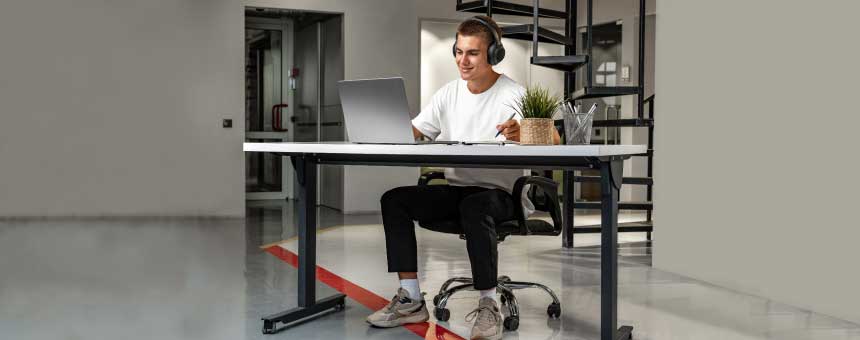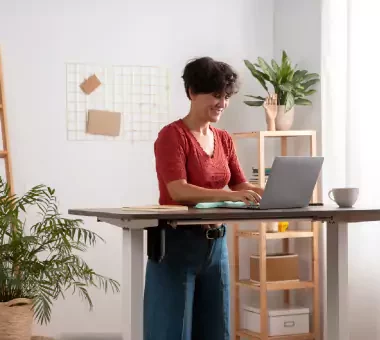In the evolving landscape of modern office design, a significant transformation is underway. The traditional cubicle, once a staple of the corporate environment, is giving way to a more dynamic and ergonomic solution: the smart desk. This shift is not merely aesthetic; it’s rooted in a deep understanding of productivity, health, and technology trends that are reshaping our workspaces. As we unpack this significant shift, it’s essential to explore why the smart desk is not just a fad but a fundamental change in how we perceive and interact with our working environments.
The Rise of the Smart Desk in Modern Workspaces
The arrival of intelligent desks heralds a significant evolution in office design, reflecting a shift towards environments that enhance both individual productivity and collective collaboration. These cutting-edge workstations are distinguished by their adaptability, featuring adjustable heights that facilitate a seamless transition between sitting and standing. This adaptability is underpinned by state-of-the-art technology, which integrates seamlessly into the desk’s design, offering users unparalleled connectivity and a streamlined work experience. Smart desks are designed with the modern worker in mind, catering to a generation that values flexibility, well-being, and efficiency in their professional lives. Their emergence highlights a shift from standardised, generic options to a more tailored and flexible approach to office design, one that recognises and caters to the varying requirements of contemporary professionals.
From Boxes to Breakout Rooms: How Workspaces are Evolving
The gradual decline of cubicles in modern office environments symbolises a broader shift towards more flexible, versatile, and collaborative workspaces.. As the work ethos shifts towards agility, creativity, and cooperation, the inflexible, insular configuration of cubicles seems progressively outdated. The move away from cubicles also mirrors the changing nature of work itself, which now favours cross-disciplinary teamwork and spontaneous interactions over the compartmentalised tasks of yesteryear. As a result, the physical barriers represented by cubicles are being dismantled and foster a sense of community and dynamic engagement among colleagues. This transition reflects a deeper understanding of how spatial design influences workplace culture, employee satisfaction, and ultimately, productivity. The decline of the cubicle is not just about changing furniture but signals a fundamental rethinking of how work environments can best support the evolving needs of the workforce.
Health Benefits Linked to Adopting a Smart Desk
The growing awareness of the negative impact of sedentary behaviour has been a key factor driving the shift towards smart desks. In-depth studies have drawn attention to the dangers of lengthy sitting periods, illuminating their association with a heightened susceptibility to numerous chronic ailments, including heart disorders and diabetes.The introduction of smart desks provides a practical solution to this contemporary issue by enabling easy transitions between sitting and standing positions throughout the workday. The dynamic nature of smart desks supports increased blood circulation, which is instrumental in enhancing cognitive function and maintaining energy levels, thereby bolstering overall productivity
How Smart Desks Support Modern Workstyles
The evolution of the workplace towards greater adaptability has positioned smart desks as pivotal enablers of contemporary working practices. These innovative desks cater to a workforce that values versatility in both their working hours and their physical environments
Let’s see how smart desks are changing the game:
- Goodbye Sitting Disease: Combat the health risks of prolonged sitting with a seamless transition between sitting and standing throughout the workday.
- Personalised Workspaces: Imagine your desk adjusting to your lighting preferences or syncing with your calendar for standing break reminders. Smart desks are ready to adapt to your needs.
- Data-Driven Optimization: Track your sitting and standing habits with data collected by your smart desk. Use this information to personalise your work routine for peak performance.
- A Connected Office Ecosystem: Smart desks are the first step towards a more connected workspace. Imagine desks interacting with lighting, climate control, and other smart furniture for a truly integrated environment.
- Reminders and Activity Tracking: Some smart desks have built-in features that remind you to take breaks or switch positions, and can even track your activity levels throughout the day
Future Technology of Smart Desks
Looking forward, the trajectory for smart desk innovation is steeped in potential. Anticipate developments such as desks equipped with AI-powered virtual assistants capable of managing schedules, responding to queries, and even adjusting environmental settings for optimal comfort and productivity. Moreover, future iterations may employ sensors to learn from user behaviour, automatically modifying their height and settings to match the user’s preferred working posture and activity level, thus personalising the workspace to unprecedented degrees. This ongoing integration of technology within the fabric of office furniture not only streamlines day-to-day tasks but also paves the way for a more intuitive and responsive working environment, tailored to the nuanced needs of the individual.
Overcoming Challenges and Making the Transition
Adopting smart desks in place of traditional cubicles poses its set of obstacles. Initial investments, reimagining office layouts, and acclimatising to novel work practices present significant considerations for organisations. Despite these challenges, the long-term advantages such as improved staff well-being, augmented efficiency, and a readiness for impending technological shifts make a compelling case for this transformation. To address these financial challenges, Desqoo has introduced enticing promotions such as free delivery and zero-cost EMI, relieving companies of the initial investment burden required to transform a traditional cubicle into a modern smart desk. Emphasising collaboration in the redesign process can ease the shift, making the transition to smart desks a collective journey towards a more dynamic and adaptable working environment.

